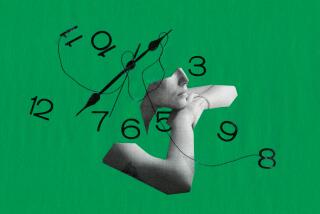Study Suggests Antidepressant May Help Treat Meth Addiction
- Share via
A common antidepressant, bupropion, can reduce the craving for methamphetamine, providing the possibility of a drug treatment for the powerfully addictive stimulant, according to a study by UCLA researchers published today.
Dr. Thomas F. Newton, a UCLA psychiatrist who led the study, found that subjects who were given bupropion reported a lesser high after a meth injection as well as a less intense craving after watching a video of actors favorably portraying meth use.
Although the four-week study involved only 20 patients, its results were encouraging because there is no drug treatment for methamphetamine addiction.
Bupropion, sold under the trade name Wellbutrin, has long been used as an antidepressant and treatment to stop smoking.
The “study is provocative and potentially promising,” said Dr. Eric Collins, a psychiatry professor and drug expert at Columbia University who was not involved in the research.
A related study, involving 120 patients, will be presented next month at a National Institute for Drug Abuse meeting, said that study’s principal investigator, UCLA psychiatry professor Richard A. Rawson.
“The new and larger trial ... may be the real test of the treatment,” Collins said.
Most addicts are treated with counseling, and recovery rates are low -- about 20%, experts say.
The drug, which is crafted from easily accessible cold medicines such as ephedrine and pseudoephedrine, increases sexual arousal and reduces inhibitions, often leading to risky sexual behavior.
About one-third of gay and bisexual men who tested positive for HIV at a Los Angeles clinic in 2004 acknowledged using meth, almost triple the rate three years earlier, officials at the L.A. Gay and Lesbian Center said.
The study, published in the journal Neuropsychopharmacology, divided 20 active meth users, ages 18 to 45, into two groups, both of which spent several days withdrawing from methamphetamine.
Both groups were then injected with 45 milligrams of the stimulant -- less than what is typically used by street addicts -- to equalize levels of the drug.
The first group was then given two intravenous doses of bupropion, while the second received a placebo.
On a 70-point scale, subjects on a placebo rated the euphoric effects of meth at 48, while those given bupropion rated it 28.
The patients were then shown the video. From a baseline of zero, patients on the placebo reported feeling a craving level of plus 10 and those given bupropion rated their craving at negative 8.
Newton speculated that the antidepressant worked by limiting the ability of brain cells to absorb dopamine, one of the key neurotransmitters that meth releases.
Collins, however, cautioned that “dopamine is a lot more complicated than other brain chemicals.”
“You can’t mess with it without affecting other parts of the brain.”






